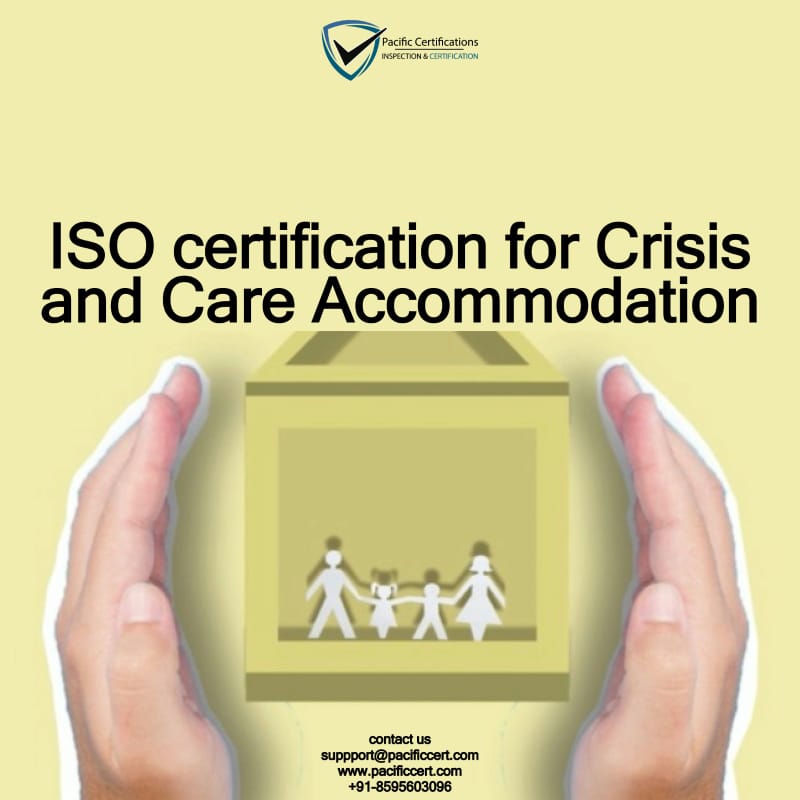ISO Certifications for Crisis and Care Accommodation Services, Requirements and Benefits

Introduction
Crisis and care accommodation service providers operate in high-risk environments where resident safety, dignity, continuity of care, confidentiality, and regulatory compliance are critical. These services include emergency shelters, domestic violence refuges, homeless accommodation, transitional housing, youth shelters, refugee accommodation, and supported living facilities that often serve vulnerable individuals and families during periods of acute need.
Organizations delivering crisis and care accommodation manage complex responsibilities such as safeguarding residents, coordinating care services, maintaining safe facilities, handling personal and health-related information, and ensuring uninterrupted operations under unpredictable conditions. ISO certifications have therefore become an essential framework for crisis and care accommodation providers to demonstrate structured governance, risk management, safeguarding controls, data protection, service continuity, and consistent care delivery across facilities and programs.
In crisis accommodation, trust is earned through systems that protect people when they are most vulnerable.
For more information on how we can assist your organization with ISO certifications, please contact us at [email protected]
Quick Summary
ISO certifications provide crisis and care accommodation service providers with internationally recognized frameworks to manage service quality through ISO 9001, safeguarding and service governance through ISO 22301 and ISO 9001, occupational health and safety through ISO 45001, information security through ISO/IEC 27001, privacy protection through ISO/IEC 27701, facility and care environment management through ISO 41001, and asset reliability through ISO 55001. These certifications help providers strengthen safeguarding controls, protect sensitive resident data, ensure continuity of care, and build confidence with funders, regulators, and partner agencies.
Applicable ISO Standards for Crisis and Care Accommodation Services
Below are the most relevant ISO standards applicable to crisis and care accommodation providers:
ISO 9001: Quality Management Systems
ISO 9001 supports structured delivery of accommodation and care services, including intake procedures, case management coordination, resident support processes, complaints handling, and continual improvement. It helps providers maintain consistent service quality across shifts, locations, and care programs.
ISO 45001: Occupational Health and Safety
Crisis accommodation environments involve elevated safety risks related to stress, conflict, health emergencies, and facility hazards. ISO 45001 provides a systematic approach to identifying risks, protecting staff and residents, managing incidents, and maintaining safe living and working environments.
ISO 27001: Information Security Management
Care and crisis accommodation providers handle highly sensitive personal, social, and sometimes health-related data. ISO/IEC 27001 ensures confidentiality, controlled access, secure record management, and incident response for resident and case information.
ISO 41001:2018 – Facility Management Systems
ISO 41001 is particularly relevant for care accommodation providers managing residential facilities, shared living spaces, security arrangements, maintenance, and outsourced services. It ensures facilities support resident safety, dignity, and service objectives
ISO/IEC 27701:2019 – Privacy Information Management Systems
ISO/IEC 27701 extends information security to privacy governance, supporting compliance with data protection laws where providers act as data controllers or processors for vulnerable individuals’ personal information.
ISO 22301: Business Continuity Management
ISO 22301 is critical for crisis accommodation services that must remain operational during emergencies, funding disruptions, natural disasters, or surges in demand. It supports preparedness, continuity planning, and coordinated response.
ISO 14001: Environmental Management Systems
For organizations that also prioritize environmental management within their operational framework, ISO 14001 helps manage environmental responsibilities in a systematic manner that contributes to the environmental pillar of sustainability.
Click here to find out more applicable standards to your industry
What are the requirements of ISO certifications for Crisis and Care Accommodation Services?
Crisis and care accommodation providers seeking ISO certification must establish and maintain documented policies, procedures, and records aligned with the selected ISO standards. Key requirements include the following:
ISO 9001:2015 – Quality Management Systems
Establish a documented quality management system
Define care, accommodation, and support service processes
Control intake, case coordination, and service delivery
Monitor service outcomes and resident feedback
Implement continual improvement practices
ISO 45001:2018 – Occupational Health and Safety Management Systems
Establish an OH&S policy suitable for care environments
Identify physical, psychological, and environmental hazards
Implement controls for incidents, emergencies, and violence risks
Monitor safety performance and corrective actions
ISO/IEC 27001:2022 – Information Security Management Systems
Establish an information security management system
Conduct risk assessments for resident and case data
Implement access controls and secure record handling
Monitor and review ISMS effectiveness
ISO/IEC 27701:2019 – Privacy Information Management Systems
Identify personal data processed during care delivery
Define privacy roles and responsibilities
Implement controls for consent, confidentiality, and retention
Manage privacy incidents and data subject requests
ISO 22301:2019 – Business Continuity Management Systems
Identify critical accommodation and support services
Develop emergency and continuity plans
Test and review continuity arrangements
Tip:Start by mapping your resident journey—from intake and assessment to accommodation, support services, and exit planning—against ISO requirements to identify safeguarding, data handling, and continuity gaps early.
For further information on how we can assist your crisis and care accommodation services with ISO certifications, contact us at [email protected].
What are the benefits of ISO Certifications for Crisis and Care Accommodation Services?
ISO certifications are suitable for emergency shelters, supported housing providers, crisis refuges, and transitional accommodation services. Key benefits include:
Stronger safeguarding and duty-of-care controls, supporting resident safety and dignity.
Improved consistency of care and accommodation services, regardless of staffing changes or demand surges.
Enhanced protection of sensitive resident information, reducing privacy and confidentiality risks.
Greater confidence from funders, regulators, and partner agencies, supporting long-term sustainability.
Improved emergency preparedness and service continuity, ensuring support during crises.
Better facility safety and asset reliability, reducing incidents and service disruptions.
Crisis and care accommodation services are experiencing increased demand alongside heightened regulatory and funding scrutiny. Sector studies indicate that emergency and supported housing demand has grown by 25–35% in many regions over the past decade, while public funding and donor requirements have shifted toward stronger accountability and documented governance. Audits of care accommodation providers show that over 60% of funding bodies now require evidence of formal quality, safeguarding, and data protection systems as part of grant and contract evaluations.
Operational risk exposure has also increased. Incident reviews highlight that organizations with structured safety, continuity, and information management frameworks experience 20–30% fewer service disruptions and reportable incidents compared to those relying on informal controls.
Looking forward, sector projections suggest that ISO-aligned management systems will increasingly become baseline expectations for medium-to-large crisis accommodation providers, as certified organizations demonstrate stronger safeguarding outcomes, better audit performance, and improved confidence among regulators, funders, and community stakeholders.
How Pacific Certifications Can Help
Pacific Certifications, accredited by ABIS, acts as an independent certification body for crisis and care accommodation service providers by conducting impartial audits against applicable ISO standards. Our role is to objectively assess whether documented management systems and operational practices conform to international ISO requirements, based strictly on verifiable evidence and records.
We support care accommodation organizations through:
Independent certification audits conducted in accordance with ISO/IEC 17021
Practical assessment of real care workflows, safeguarding controls, and facility operations
Clear audit reporting reflecting conformity status and certification decisions
Internationally recognized ISO certification upon successful compliance
Surveillance and recertification audits to maintain certification validity
If you need support with ISO certification for your crisis or care accommodation services, contact us at [email protected]or +91-8595603096.
Ready to get ISO certified?
Contact Pacific Certifications to begin your certification journey today!
Author: Ashish
Suggested Certifications:
Read more: Pacific Blogs
